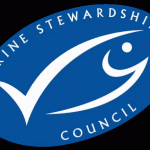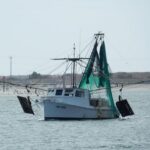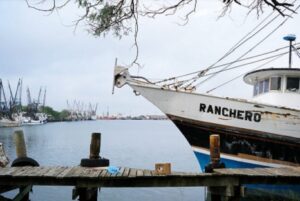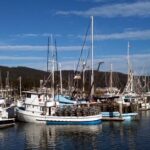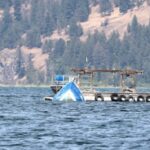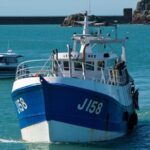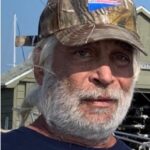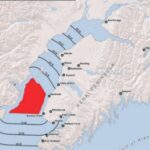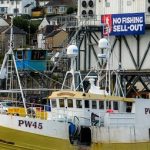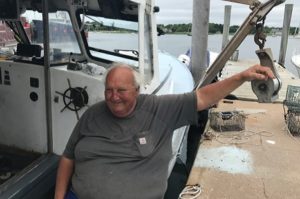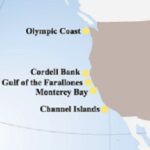Category Archives: North Pacific

Federal cuts endanger ‘critical’ safety program for Alaska’s commercial fishermen
Recent cuts to the U.S. Department of Health and Human Services could end programs that are “critical” for commercial fishing safety in Alaska, according to the Alaska Marine Safety Education Association, which receives funding from the National Institute for Occupational Safety and Health. The federal institute, known by the acronym NIOSH, is responsible for counting the number of commercial fishermen accidents and fatalities and providing funding for commercial fishing safety training. The director of the Alaska Marine Safety Association, also known as AMSEA, said that the funding for those safety programs saves millions of dollars every year by reducing the need for costly Coast Guard search and rescue operations. Teaching fishermen safety skills does not completely eliminate fatalities in what is still a dangerous profession – but it has reduced them by roughly 80% since NIOSH first introduced its commercial safety fishing programs in 1985, according to AMSEA director Leann Cyr. more, >>CLICK TO READ<< 07:53
Fields family faces charges in Alaska fishery fraud case involving illegal permits
 A high-profile fishery fraud case has surfaced in Kodiak. After a lengthy investigation, the Alaska Wildlife Troopers have filed criminal charges against four members of the Fields family and their company, Fields & Sons Inc. Charged are 69-year-old Duncan Fields, 64-year-old Wallace Fields, 66-year-old Beth Fields, and 67-year-old Leslie Fields, all residents of Kodiak. The charges stem from alleged violations of Alaska fishing laws and regulations committed between 2020 and 2024. According to the Alaska Wildlife Troopers, the Fields family illegally transferred commercial salmon setnet permits by falsely gifting them to crewmembers, only to reclaim them later—actions strictly prohibited under state law. more, >>CLICK TO READ<< 17:30
A high-profile fishery fraud case has surfaced in Kodiak. After a lengthy investigation, the Alaska Wildlife Troopers have filed criminal charges against four members of the Fields family and their company, Fields & Sons Inc. Charged are 69-year-old Duncan Fields, 64-year-old Wallace Fields, 66-year-old Beth Fields, and 67-year-old Leslie Fields, all residents of Kodiak. The charges stem from alleged violations of Alaska fishing laws and regulations committed between 2020 and 2024. According to the Alaska Wildlife Troopers, the Fields family illegally transferred commercial salmon setnet permits by falsely gifting them to crewmembers, only to reclaim them later—actions strictly prohibited under state law. more, >>CLICK TO READ<< 17:30
Fisherman reported missing, found dead in Alaska was an Escanaba native
 A 28-year-old Escanaba native has been found dead at the scene of the fishing boat he worked on in Alaska. The man, Jacob Riley Veeser, was originally reported missing on the afternoon Friday, April 4, by crewmates of the ship, F/V Lady Alaska, which was featured on the popular show “Deadliest Catch.” They were docked on Unalaska Island, just one of the Fox Islands in the Aleutian Islands chain in southern Alaska. The crew said Veeser was last seen walking down the G1 “dolphin” dock at Unisea Inc. in Unalaska around midnight. The day before that, Thursday, April 3, local news stations warned about a winter storm coming in. more, >>CLICK TO READ<< 08:57
A 28-year-old Escanaba native has been found dead at the scene of the fishing boat he worked on in Alaska. The man, Jacob Riley Veeser, was originally reported missing on the afternoon Friday, April 4, by crewmates of the ship, F/V Lady Alaska, which was featured on the popular show “Deadliest Catch.” They were docked on Unalaska Island, just one of the Fox Islands in the Aleutian Islands chain in southern Alaska. The crew said Veeser was last seen walking down the G1 “dolphin” dock at Unisea Inc. in Unalaska around midnight. The day before that, Thursday, April 3, local news stations warned about a winter storm coming in. more, >>CLICK TO READ<< 08:57
Body of missing fisherman recovered along Captains Bay shoreline
 The Unalaska Fire and Police Departments, along with members of the U.S. Coast Guard and Alaska State Troopers recovered the body of missing fisherman Jacob Riley Veeser Saturday morning. 28-year-old Veeser was reported missing Friday afternoon. City officials said in a press release that evening that he was last seen at midnight on April 4 walking down the GI “dolphin” dock at the UniSea Inc. processing plant. Veeser, a crewmember aboard the F/V Lady Alaska, was discovered in the water along Captains Bay Rd. around 10:30 a.m. Saturday morning. more, >>CLICK TO READ<< 12:31
The Unalaska Fire and Police Departments, along with members of the U.S. Coast Guard and Alaska State Troopers recovered the body of missing fisherman Jacob Riley Veeser Saturday morning. 28-year-old Veeser was reported missing Friday afternoon. City officials said in a press release that evening that he was last seen at midnight on April 4 walking down the GI “dolphin” dock at the UniSea Inc. processing plant. Veeser, a crewmember aboard the F/V Lady Alaska, was discovered in the water along Captains Bay Rd. around 10:30 a.m. Saturday morning. more, >>CLICK TO READ<< 12:31
City of Unalaska in search of missing fisherman
 A 28-year-old fisherman was reported missing Friday in Unalaska. The City of Unalaska said in a press release that Jacob Riley Veeser was last seen at midnight on April 4 walking down the GI “dolphin” dock at the UniSea Inc. processing plant. Local police, fire and ports departments began a shoreline search for Veeser shortly before 7 p.m. Friday evening. The search was suspended around 10:30 last night and will pick back up again Saturday morning. The search team plans to use remotely operated vehicles to survey underwater. Veeser is described as a 6-foot, 200-pound white male with brown hair, brown eyes and a full beard and mustache. He is a crewmember on the F/V Lady Alaska. more, >>CLICK TO READ<< 09:08
A 28-year-old fisherman was reported missing Friday in Unalaska. The City of Unalaska said in a press release that Jacob Riley Veeser was last seen at midnight on April 4 walking down the GI “dolphin” dock at the UniSea Inc. processing plant. Local police, fire and ports departments began a shoreline search for Veeser shortly before 7 p.m. Friday evening. The search was suspended around 10:30 last night and will pick back up again Saturday morning. The search team plans to use remotely operated vehicles to survey underwater. Veeser is described as a 6-foot, 200-pound white male with brown hair, brown eyes and a full beard and mustache. He is a crewmember on the F/V Lady Alaska. more, >>CLICK TO READ<< 09:08
Chinook harvest limit down nearly 40 percent from last year
 The harvest allocation for king salmon in Southeast Alaska is lower than the region’s commercial trollers expected. The Alaska Department of Fish and Game announced Tuesday (4-1-25) that 130,800 treaty Chinook salmon will be available this year for all Southeast fisheries, down almost 40% from last year’s allocation. From that total, trollers are allowed to catch 92,700 king salmon. The balance of treaty salmon goes primarily to sport anglers. Sitkan Matt Donohoe is the vice chair of the Alaska Trollers Association. “We heard that it’s going to be lower than last year, but we didn’t know how much,” “It’s a devastating number. It’s the worst ever. I mean, what industry can afford a 40% reduction?” more, >>CLICK TO READ<< 19:11
The harvest allocation for king salmon in Southeast Alaska is lower than the region’s commercial trollers expected. The Alaska Department of Fish and Game announced Tuesday (4-1-25) that 130,800 treaty Chinook salmon will be available this year for all Southeast fisheries, down almost 40% from last year’s allocation. From that total, trollers are allowed to catch 92,700 king salmon. The balance of treaty salmon goes primarily to sport anglers. Sitkan Matt Donohoe is the vice chair of the Alaska Trollers Association. “We heard that it’s going to be lower than last year, but we didn’t know how much,” “It’s a devastating number. It’s the worst ever. I mean, what industry can afford a 40% reduction?” more, >>CLICK TO READ<< 19:11
Alaskan Communities Use Flexibility in Snow Crab Fishery Alaskan Communities for Economic Relief
 The Alaska Bering Sea snow crab fishery is open for the first time in 2 years after a sharp decline in the crab population caused fishery closures. Participants have banded together with NOAA Fisheries to use regulatory flexibilities to help the fishery operate smoothly. While the species shows signs of recovery, it is still in low abundance. There are continued challenges for harvesters, processors, and small coastal communities who depend on the fishery for their income and way of life. We estimate that more than 10 billion snow crabs disappeared from the Bering Sea from 2018 to 2021 due to a marine heatwave and ecological shifts in the region. The snow crab fishery is an important economic driver in Alaska, generating an average of $150 million annually from 2012 to 2021. Disaster relief funding from the Department of Commerce in 2022–2023 provided some assistance to fishing communities. more, >>CLICK TO READ<< 11:47
The Alaska Bering Sea snow crab fishery is open for the first time in 2 years after a sharp decline in the crab population caused fishery closures. Participants have banded together with NOAA Fisheries to use regulatory flexibilities to help the fishery operate smoothly. While the species shows signs of recovery, it is still in low abundance. There are continued challenges for harvesters, processors, and small coastal communities who depend on the fishery for their income and way of life. We estimate that more than 10 billion snow crabs disappeared from the Bering Sea from 2018 to 2021 due to a marine heatwave and ecological shifts in the region. The snow crab fishery is an important economic driver in Alaska, generating an average of $150 million annually from 2012 to 2021. Disaster relief funding from the Department of Commerce in 2022–2023 provided some assistance to fishing communities. more, >>CLICK TO READ<< 11:47
Russia’s ongoing war on Alaska fishermen
 These are tough times for Alaska’s fishermen, and Russia is a primary cause. During his recent confirmation hearing, Commerce Secretary Howard Lutnick joked with Alaska Sen. Dan Sullivan about the need to counter “communist fish.” In reality, the future of our entire industry could hinge on whether Secretary Lutnick succeeds. For more than a decade, the Kremlin has been implementing policies that take direct aim at Alaska’s fishing sector. In 2014, Russia banned U.S. seafood imports, choking off a $60 million market for Alaska fishermen, with pink salmon roe hit especially hard. In direct response, ex-vessel prices for pink salmon declined from $0.42 per pound to $0.23 per pound in 2015. By Matt Alward. more, >>CLICK TO READ<< 07:18
These are tough times for Alaska’s fishermen, and Russia is a primary cause. During his recent confirmation hearing, Commerce Secretary Howard Lutnick joked with Alaska Sen. Dan Sullivan about the need to counter “communist fish.” In reality, the future of our entire industry could hinge on whether Secretary Lutnick succeeds. For more than a decade, the Kremlin has been implementing policies that take direct aim at Alaska’s fishing sector. In 2014, Russia banned U.S. seafood imports, choking off a $60 million market for Alaska fishermen, with pink salmon roe hit especially hard. In direct response, ex-vessel prices for pink salmon declined from $0.42 per pound to $0.23 per pound in 2015. By Matt Alward. more, >>CLICK TO READ<< 07:18
Trump’s Regulatory Freeze Throws US Fishing Industry Into Chaos
 President Donald Trump’s regulatory freeze has injected chaos and uncertainty into a number of lucrative American fisheries, raising the risk of a delayed start to the fishing season for some East Coast cod and haddock fleets and leading to overfishing of Atlantic bluefin tuna, according to Reuters interviews with industry groups and federal government employees. America’s $320 billion fishing industry relies on a branch of the federal government, the National Oceanic and Atmospheric Administration, to manage coastal fisheries. Under a 1976 law, NOAA’s National Marine Fisheries Service develops management plans for 45 fisheries, setting quotas and determining the start and close of fishing seasons, in consultation with federal government scientists and local fishermen. more, >>CLICK TO READ<< 09:19
President Donald Trump’s regulatory freeze has injected chaos and uncertainty into a number of lucrative American fisheries, raising the risk of a delayed start to the fishing season for some East Coast cod and haddock fleets and leading to overfishing of Atlantic bluefin tuna, according to Reuters interviews with industry groups and federal government employees. America’s $320 billion fishing industry relies on a branch of the federal government, the National Oceanic and Atmospheric Administration, to manage coastal fisheries. Under a 1976 law, NOAA’s National Marine Fisheries Service develops management plans for 45 fisheries, setting quotas and determining the start and close of fishing seasons, in consultation with federal government scientists and local fishermen. more, >>CLICK TO READ<< 09:19
Fishermen want to go green but say DOGE cuts prevent that
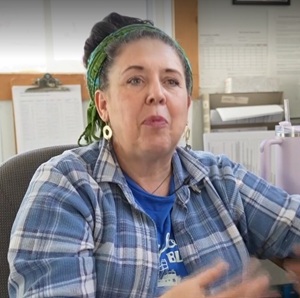 Commercial fishermen and seafood processors and distributors looking to switch to new, lower-carbon emission systems say the federal funding they relied on for this work is either frozen or unavailable due to significant budget cuts promoted by President Donald Trump’s Department of Government Efficiency. The changes are designed to replace old diesel-burning engines and outdated at-sea cooling systems and are touted by environmentalists as a way to reduce seafood’s carbon footprint. Salmon harvesters in Washington state, scallop distributors in Maine and halibut fishermen in Alaska are among those who told The Associated Press their federal commitments for projects like new boat engines and refrigeration systems have been rescinded or are under review. Photos, video, more, >>CLICK TO READ<< 10:51
Commercial fishermen and seafood processors and distributors looking to switch to new, lower-carbon emission systems say the federal funding they relied on for this work is either frozen or unavailable due to significant budget cuts promoted by President Donald Trump’s Department of Government Efficiency. The changes are designed to replace old diesel-burning engines and outdated at-sea cooling systems and are touted by environmentalists as a way to reduce seafood’s carbon footprint. Salmon harvesters in Washington state, scallop distributors in Maine and halibut fishermen in Alaska are among those who told The Associated Press their federal commitments for projects like new boat engines and refrigeration systems have been rescinded or are under review. Photos, video, more, >>CLICK TO READ<< 10:51
As Alaska’s crab industry struggles, herring fishermen are losing their market
 Captain Dan Veerhusen and Jan, his wife, run the F/V Taurus, one of the few remaining boats that still fish herring in the Bering Sea. Last summer, in Sand Point, the couple were preparing the 58-foot seiner for what would be Veerhusen’s 30th-or-so season. He’s been fishing herring since 1988, when Unalaska’s Port of Dutch Harbor was at the center of a multimillion-dollar crab boom. “I love herring fishing. It’s real fishing.” he said. “It was a regular, competitive fishery back then. But these days, there’s ourselves, another boat, maybe three boats out there.” The herring fishery in the Bering Sea boomed in the early 20th century but struggled after World War II as Americans lost their appetite for the fish. Demand increased again in the 1970s when the Bering Sea crab industry took off, creating a demand for herring as baitfish. links, more, >>CLICK TO READ<< 16:50
Captain Dan Veerhusen and Jan, his wife, run the F/V Taurus, one of the few remaining boats that still fish herring in the Bering Sea. Last summer, in Sand Point, the couple were preparing the 58-foot seiner for what would be Veerhusen’s 30th-or-so season. He’s been fishing herring since 1988, when Unalaska’s Port of Dutch Harbor was at the center of a multimillion-dollar crab boom. “I love herring fishing. It’s real fishing.” he said. “It was a regular, competitive fishery back then. But these days, there’s ourselves, another boat, maybe three boats out there.” The herring fishery in the Bering Sea boomed in the early 20th century but struggled after World War II as Americans lost their appetite for the fish. Demand increased again in the 1970s when the Bering Sea crab industry took off, creating a demand for herring as baitfish. links, more, >>CLICK TO READ<< 16:50
Poopdeck: Nearly a century of adventure — Part 6
 Clarence Hiram “Poopdeck” Platt said he didn’t quit commercial fishing because he was too old or couldn’t handle the workload anymore. He quit because he didn’t feel like doing it anymore. In a 1992 interview with KBBI public radio in Homer, he explained his actions: “I (had) really enjoyed fishing, but all of a sudden, for some reason or other, it quit being fun. I wasn’t enjoying it. I wasn’t looking forward to it. I was dreading it … and I said that’s enough. So, I sold out to my grandson (Erik Huebsch, in 1984) my boat, permit, gear and the whole works…. I haven’t regretted quitting at all.” Despite the diminishment of joy Poopdeck felt as he entered retirement, he loved his long tenure as a fisherman. more, >>CLICK TO READ<< 09:40
Clarence Hiram “Poopdeck” Platt said he didn’t quit commercial fishing because he was too old or couldn’t handle the workload anymore. He quit because he didn’t feel like doing it anymore. In a 1992 interview with KBBI public radio in Homer, he explained his actions: “I (had) really enjoyed fishing, but all of a sudden, for some reason or other, it quit being fun. I wasn’t enjoying it. I wasn’t looking forward to it. I was dreading it … and I said that’s enough. So, I sold out to my grandson (Erik Huebsch, in 1984) my boat, permit, gear and the whole works…. I haven’t regretted quitting at all.” Despite the diminishment of joy Poopdeck felt as he entered retirement, he loved his long tenure as a fisherman. more, >>CLICK TO READ<< 09:40
Gov. Dunleavy requests five new fishery disasters including Kodiak’s 2024 pink salmon season
 On Jan. 30 Governor Mike Dunleavy submitted five new requests for federal fisheries disaster assistance for last summer’s salmon season. That includes commercial salmon fisheries on the Alaska Peninsula, Kodiak, Chignik, Lower Cook Inlet and Prince William Sound. The state accounts for roughly half, 26 out of 53, of the fishery disasters declared around the country since 2020, which include a variety of species like salmon, crab and Pacific cod. In Kodiak, fishermen harvested 7.6 million pinks last summer, which was less than 40% percent of the ten-year average of 20.4 million fish. That meant last summer was one of the lowest valued commercial pink salmon seasons on record for Kodiak Island. more, >>CLICK TO READ<< 07:57
On Jan. 30 Governor Mike Dunleavy submitted five new requests for federal fisheries disaster assistance for last summer’s salmon season. That includes commercial salmon fisheries on the Alaska Peninsula, Kodiak, Chignik, Lower Cook Inlet and Prince William Sound. The state accounts for roughly half, 26 out of 53, of the fishery disasters declared around the country since 2020, which include a variety of species like salmon, crab and Pacific cod. In Kodiak, fishermen harvested 7.6 million pinks last summer, which was less than 40% percent of the ten-year average of 20.4 million fish. That meant last summer was one of the lowest valued commercial pink salmon seasons on record for Kodiak Island. more, >>CLICK TO READ<< 07:57

Guest writers: Bellingham’s SE Alaska salmon fleet threatened by lawsuits, misinformation
We appreciated Ed Johnston’s opinion editorial on Feb. 19, calling for cooperation in how we manage our salmon fisheries under the Pacific Salmon Treaty. As Washingtonians and Alaskans, we know that our shared Pacific salmon fisheries must be managed in a manner that considers how interceptions of salmon bound for distant watersheds may impact ecosystems, salmon populations and communities coastwide. That is why Washington sits alongside Alaska — as well as Canada — at the negotiating table under the Pacific Salmon Treaty. In order for our salmon and people to thrive, interceptions of salmon between the two countries must be managed using sound science and a cooperative approach. Our commitment to cooperative management and working collaboratively under the Pacific Salmon Treaty is as strong as our commitment to sustainable fishing livelihoods. more, >>CLICK TO READ<< 08:24
Deadliest Catch Season 21 release date: When does the series premiere?
 As anticipation builds for the upcoming season, fans are eager to learn about the challenges and adventures that await the fleet. While official announcements regarding the premiere date remain undisclosed, recent developments suggest that production is well underway, hinting at another thrilling installment on the horizon. Season 20 left views anticipating more as several storylines are yet to have a conclusion. As of January 2025, filming for Season 21 of Deadliest Catch has commenced. Camera operator Newton Garcia Ward provided fans with a glimpse behind the scenes by sharing photos from the set on Instagram. Photos, more, >>CLICK TO READ<< 13:30
As anticipation builds for the upcoming season, fans are eager to learn about the challenges and adventures that await the fleet. While official announcements regarding the premiere date remain undisclosed, recent developments suggest that production is well underway, hinting at another thrilling installment on the horizon. Season 20 left views anticipating more as several storylines are yet to have a conclusion. As of January 2025, filming for Season 21 of Deadliest Catch has commenced. Camera operator Newton Garcia Ward provided fans with a glimpse behind the scenes by sharing photos from the set on Instagram. Photos, more, >>CLICK TO READ<< 13:30
NOAA firings hit crucial Alaska weather service, fishery research
 Alaskans were among the hundreds of National Oceanic and Atmospheric Administration employees who began receiving firing notices this week, a blow to an agency that provides everything from weather forecasts to fisheries management to cutting-edge climate science in Alaska. The cuts — part of a broader effort by the administration of President Donald Trump to drastically slash the federal workforce — came after other agencies, including the National Park Service, had abruptly fired probationary workers in recent weeks. Nationally, more than 800 people across NOAA, an organization of 13,000 staff members, were fired, the New York Times reported Thursday. In Alaska, it was not immediately clear how many had lost their jobs, but they included NOAA employees working on fishery research and weather monitoring, among other functions. Photos, more, >>CLICK TO READ<< 10:21
Alaskans were among the hundreds of National Oceanic and Atmospheric Administration employees who began receiving firing notices this week, a blow to an agency that provides everything from weather forecasts to fisheries management to cutting-edge climate science in Alaska. The cuts — part of a broader effort by the administration of President Donald Trump to drastically slash the federal workforce — came after other agencies, including the National Park Service, had abruptly fired probationary workers in recent weeks. Nationally, more than 800 people across NOAA, an organization of 13,000 staff members, were fired, the New York Times reported Thursday. In Alaska, it was not immediately clear how many had lost their jobs, but they included NOAA employees working on fishery research and weather monitoring, among other functions. Photos, more, >>CLICK TO READ<< 10:21
Sleeping with the fishes: It’s time to resurrect accountability in U.S. fishery regulation
 If you’re expected to comply with hundreds of federal rules and regulations that affect your livelihood, wouldn’t you like to know that those rules come from people accountable to you in some way? That’s how our laws are made, after all. They come from Congress, which is accountable to the people through the democratic process. Yet much of what we call federal law comes in the form of rules that are not written by Congress but by unelected bureaucrats in hundreds of federal agencies. To make sure even bureaucrats are accountable, the Constitution usually requires them to be appointed by the president, with Senate confirmation if they have significant authority, like the power to issue rules with the force of law. Unfortunately, Congress often side-steps the Constitution by giving the job of appointing certain officers to someone else. A good example is the regulation of marine fisheries. more, >>CLICK TO READ<< 10:40
If you’re expected to comply with hundreds of federal rules and regulations that affect your livelihood, wouldn’t you like to know that those rules come from people accountable to you in some way? That’s how our laws are made, after all. They come from Congress, which is accountable to the people through the democratic process. Yet much of what we call federal law comes in the form of rules that are not written by Congress but by unelected bureaucrats in hundreds of federal agencies. To make sure even bureaucrats are accountable, the Constitution usually requires them to be appointed by the president, with Senate confirmation if they have significant authority, like the power to issue rules with the force of law. Unfortunately, Congress often side-steps the Constitution by giving the job of appointing certain officers to someone else. A good example is the regulation of marine fisheries. more, >>CLICK TO READ<< 10:40
Remembering Mason Evich: GoFundMe set up for Fairhaven man killed in head-on crash
 Friends and family of 28-year-old Mason Evich remember him as someone who will be deeply missed by all who had the privilege of knowing him. The commercial fisherman tragically lost his life in a head-on crash on the New Bedford-Fairhaven Bridge on Feb. 20, and heartfelt tributes are flooding in to honor his memory. A GoFundMe, Honoring Mason’s Life with Love, was started by Ryley Santos as a tribute to Evich. To date it has raised more than $58,000, exceeding the initial $25,000 goal. A group of friends got together and wrote a tribute to Evich on GoFundMe. Links, more, >>CLICK TO READ 06:53
Friends and family of 28-year-old Mason Evich remember him as someone who will be deeply missed by all who had the privilege of knowing him. The commercial fisherman tragically lost his life in a head-on crash on the New Bedford-Fairhaven Bridge on Feb. 20, and heartfelt tributes are flooding in to honor his memory. A GoFundMe, Honoring Mason’s Life with Love, was started by Ryley Santos as a tribute to Evich. To date it has raised more than $58,000, exceeding the initial $25,000 goal. A group of friends got together and wrote a tribute to Evich on GoFundMe. Links, more, >>CLICK TO READ 06:53
Commercial Fisherman Mason C. Evich, 28, of Fairhaven died February 20, 2025. He was a devoted son, brother, and loyal friend.
 He was everything wonderful. If you were lucky enough to know Mason, you LOVED him. A beacon of kindness, with a gentle soul that touched everyone he met, the pain we feel in losing him is indescribable. Born in Seattle, Washington, Mason was the loving son of Dagne (Sovik) Evich and the late Adam Evich. Mason’s love for fishing was passed down from his father, a lifelong commercial fisherman. Each summer, Mason accompanied his dad to Bristol Bay, Alaska, where they salmon fished together on the family’s fishing vessel. After graduating from Fairhaven High School, Mason attended the Northeast Maritime Institute, where he earned his associate degree and captain’s license. He later worked as a mate on commercial fishing vessels out of Cape May, NJ, and New Bedford, MA. more, >>CLICK TO READ<< 14:28
He was everything wonderful. If you were lucky enough to know Mason, you LOVED him. A beacon of kindness, with a gentle soul that touched everyone he met, the pain we feel in losing him is indescribable. Born in Seattle, Washington, Mason was the loving son of Dagne (Sovik) Evich and the late Adam Evich. Mason’s love for fishing was passed down from his father, a lifelong commercial fisherman. Each summer, Mason accompanied his dad to Bristol Bay, Alaska, where they salmon fished together on the family’s fishing vessel. After graduating from Fairhaven High School, Mason attended the Northeast Maritime Institute, where he earned his associate degree and captain’s license. He later worked as a mate on commercial fishing vessels out of Cape May, NJ, and New Bedford, MA. more, >>CLICK TO READ<< 14:28

Top Alaska House legislators reject plan to allow fish farms
Two leading members of the Alaska House of Representatives on Monday announced their opposition to a proposal from Gov. Mike Dunleavy to lift the state’s 35-year-old ban on fish farms. In a written statement, Speaker of the House Bryce Edgmon, I-Dillingham, and House Rules Committee Chair Louise Stutes, R-Kodiak, said the bill will not aid the state’s commercial fishing industry. Stutes also chairs the House Fisheries Committee, and Edgmon is the committee’s vice chair; without their support, House Bill 111 is unlikely to advance. Dunleavy has proposed keeping a ban on salmon farming but is seeking permission for farming other types of fish. Alaska has banned all types of fish farming for decades under the belief that allowing farming poses social and environmental risks to the state’s wild fish. more, >>CLICK TO READ<< 11:11

NOAA set to slash jobs ‘imminently’
Mass firings are set to hit the National Oceanic and Atmospheric Administration (NOAA) “imminently,” a source with knowledge told The Hill. The person, who asked to speak anonymously due to fear of reprisals, said that the agency had not yet been subjected to the steep cuts announced elsewhere due to the then-pending confirmation of Commerce Secretary Howard Lutnick. The Commerce Department oversees NOAA and the National Weather Service. Many of the federal cuts thus far have targeted probationary workers, which includes recent hires but also those who have been recently promoted. more, >>CLICK TO READ<< 12:34
How a Risky State Investment in Seafood Cost Alaskans Millions and left a Fishing Town in Crisis
 Last summer, an unsettling quiet cloaked the isolated Southwest Alaska community of King Cove as the town’s economic engine — a sprawling seafood processing plant — sat shuttered. Bunkhouses, once filled with hundreds of workers during the peak salmon harvest, were vacant. Four diesel generators that had rumbled day and night were stilled. The plant docks, once lined with boats and circled by fish-scavenging gulls, were empty. The closure resulted from the financial implosion of the plant’s owner, Peter Pan Seafood. Some local fishing boat captains directed their ire at company leaders who accepted their seafood, then failed to pay them. They dwelled far less on a surprising, largely silent, powerhouse investor in the plant: the state of Alaska. Photos, more, >>CLICK TO READ<< 12:41
Last summer, an unsettling quiet cloaked the isolated Southwest Alaska community of King Cove as the town’s economic engine — a sprawling seafood processing plant — sat shuttered. Bunkhouses, once filled with hundreds of workers during the peak salmon harvest, were vacant. Four diesel generators that had rumbled day and night were stilled. The plant docks, once lined with boats and circled by fish-scavenging gulls, were empty. The closure resulted from the financial implosion of the plant’s owner, Peter Pan Seafood. Some local fishing boat captains directed their ire at company leaders who accepted their seafood, then failed to pay them. They dwelled far less on a surprising, largely silent, powerhouse investor in the plant: the state of Alaska. Photos, more, >>CLICK TO READ<< 12:41
Fishery managers start a process to tighten salmon bycatch rules in Alaska’s Bering Sea
 Federal fishery managers took steps on Tuesday to impose new rules to prevent Alaska chum salmon from being scooped into nets used to catch Bering Sea pollock, an industrial-scale fishery that makes up the nation’s largest single-species commercial seafood harvest. The North Pacific Fishery Management Council advanced a suite of new protections intended to combat the pollock trawlers’ salmon bycatch, the term for the incidental catch of unintended species. Proposed steps in the package include numeric caps on total chum salmon bycatch, with varying allocations for different sectors of the pollock fleet; protective limits in corridors known to be used by salmon migrating through the ocean back to Western Alaska freshwater spawning areas; and provisions that would link new limits in the ocean to real-time salmon counts and conditions in the rivers. more, >>CLICK TO READ<< 12:31
Federal fishery managers took steps on Tuesday to impose new rules to prevent Alaska chum salmon from being scooped into nets used to catch Bering Sea pollock, an industrial-scale fishery that makes up the nation’s largest single-species commercial seafood harvest. The North Pacific Fishery Management Council advanced a suite of new protections intended to combat the pollock trawlers’ salmon bycatch, the term for the incidental catch of unintended species. Proposed steps in the package include numeric caps on total chum salmon bycatch, with varying allocations for different sectors of the pollock fleet; protective limits in corridors known to be used by salmon migrating through the ocean back to Western Alaska freshwater spawning areas; and provisions that would link new limits in the ocean to real-time salmon counts and conditions in the rivers. more, >>CLICK TO READ<< 12:31
Fire at Sand Point Trident plant halts operations, leaves locals without fuel
 Sand Point is without access to fuel after a fire broke out at the local Trident Seafoods plant. The fire started early Thursday morning, pausing the processor’s operations, including its fuel sales, which the small eastern Aleutian community relies on. Sand Point Police Chief Benjamin Allen said the lack of fuel is the biggest concern at the moment. “Nobody can get gas right now,” Allen said. “[Trident] has to get clearance from the Coast Guard before they can start the gas pumps back up again.” “During the incident, their generator threw a connecting rod out the side of the engine block and it ruptured the fuel line to the generator,” Allen said. “And there was a good bit of diesel on the surface of the water that Trident’s been cleaning up.” more, >>CLICK TO READ<< 13:28
Sand Point is without access to fuel after a fire broke out at the local Trident Seafoods plant. The fire started early Thursday morning, pausing the processor’s operations, including its fuel sales, which the small eastern Aleutian community relies on. Sand Point Police Chief Benjamin Allen said the lack of fuel is the biggest concern at the moment. “Nobody can get gas right now,” Allen said. “[Trident] has to get clearance from the Coast Guard before they can start the gas pumps back up again.” “During the incident, their generator threw a connecting rod out the side of the engine block and it ruptured the fuel line to the generator,” Allen said. “And there was a good bit of diesel on the surface of the water that Trident’s been cleaning up.” more, >>CLICK TO READ<< 13:28
In memory of Martin “Skooky” Parsons
 Martin Parsons, born Nov. 6, 1937, in Cordova, Alaska, passed away peacefully on Jan. 11, 2025, in Kirkland Washington, at the age of 87 where he lived a “Hell of a life!” He was known affectionately as “Skooky,” a nickname given by the Arvidson family when he was a kid, which stuck with him throughout his life. He was loved, cherished, and respected by his family and countless friends. Born of Scandinavian and Aleut descent, he was the son of Martin and May Parsons. Skooky lived in Alice Cove, grew up in Cordova, and graduated from Cordova High School. Following his education, he enlisted in the Army before returning to Cordova to pursue a career as a commercial fisherman. He spent many years gillnetting on the Copper River Flats and seining in Prince William Sound, embodying the hardworking spirit of Alaska’s fishing community. He was well known for his “marker sets” in Castle, or “round hauling” dogs in Sheep Bay. By Martin Parsons, Jr. more, >>CLICK TO READ<< 08:04
Martin Parsons, born Nov. 6, 1937, in Cordova, Alaska, passed away peacefully on Jan. 11, 2025, in Kirkland Washington, at the age of 87 where he lived a “Hell of a life!” He was known affectionately as “Skooky,” a nickname given by the Arvidson family when he was a kid, which stuck with him throughout his life. He was loved, cherished, and respected by his family and countless friends. Born of Scandinavian and Aleut descent, he was the son of Martin and May Parsons. Skooky lived in Alice Cove, grew up in Cordova, and graduated from Cordova High School. Following his education, he enlisted in the Army before returning to Cordova to pursue a career as a commercial fisherman. He spent many years gillnetting on the Copper River Flats and seining in Prince William Sound, embodying the hardworking spirit of Alaska’s fishing community. He was well known for his “marker sets” in Castle, or “round hauling” dogs in Sheep Bay. By Martin Parsons, Jr. more, >>CLICK TO READ<< 08:04

Elon, it’s time to sic the DOGE on BOEM, and NMFS By Jim Lovgren
The Trump administration has begun a long overdue financial analysis of the spending habits of federal agencies, looking to weed out waste, fraud, incompetence, bureaucratic overlap of different agencies, and unnecessary regulations. To do this he has recruited Elon Musk, the world’s richest man, who earned his wealth by his shear brilliance, to lead a new agency, called DOGE, Department of Governmental Efficiency. While there are plenty of federal departments that need cleaning up, or elimination, let’s hope that Elon doesn’t overlook BOEM and the NMFS. Let’s start with the Bureau of Ocean Energy Management, the agency that cavalierly sells the ocean bottom and its non-renewable resources to the highest bidder. This is an agency that has always been surrounded by controversy and corruption so bad that they had to change their name years ago from the Marine Minerals Service to its present BOEM. More, >>CLICK TO READ<< 18:57
Democrats accuse DOGE of going after NOAA
 Democratic lawmakers on Wednesday accused Elon Musk’s Department of Government Efficiency (DOGE) of improperly inserting itself into the National Oceanic and Atmospheric Administration (NOAA). In a joint statement, Reps. Zoe Lofgren (D-Calif.) and Jared Huffman (D-Calif.) said Musk’s cost-cutting group of accessing NOAA’s computer systems. NOAA is charged with forecasting weather, monitoring atmospheric conditions and mapping the seas, among other things. “Elon Musk and his DOGE hackers are ransacking their way through the federal government, unlawfully gaining unfettered access to Americans’ private information and gutting programs people depend on,” said Huffman and Lofgren, the top Democrats on the House Natural Resources and Science, Space and Technology committees, respectively. Video, more, >>CLICK TO READ<< 07:57
Democratic lawmakers on Wednesday accused Elon Musk’s Department of Government Efficiency (DOGE) of improperly inserting itself into the National Oceanic and Atmospheric Administration (NOAA). In a joint statement, Reps. Zoe Lofgren (D-Calif.) and Jared Huffman (D-Calif.) said Musk’s cost-cutting group of accessing NOAA’s computer systems. NOAA is charged with forecasting weather, monitoring atmospheric conditions and mapping the seas, among other things. “Elon Musk and his DOGE hackers are ransacking their way through the federal government, unlawfully gaining unfettered access to Americans’ private information and gutting programs people depend on,” said Huffman and Lofgren, the top Democrats on the House Natural Resources and Science, Space and Technology committees, respectively. Video, more, >>CLICK TO READ<< 07:57






 A Southeast Alaska commercial fisherman was sentenced today to six months in prison for falsifying fishing records in violation of the Lacey Act and illegally taking a sperm whale in violation of the Endangered Species Act. According to court documents, between October and November 2020, Dugan Paul Daniels, 55, of Coffman Cove, knowingly submitted false records about his commercial fishing activities to make it appear that he lawfully caught sablefish, aka “black cod,” in federal waters on two separate occasions. An investigation revealed he harvested the fish illegally in State of Alaska waters, specifically, in Chatham Strait and Clarence Strait, respectively. The total market value of the illegally harvested fish was $127,528.
A Southeast Alaska commercial fisherman was sentenced today to six months in prison for falsifying fishing records in violation of the Lacey Act and illegally taking a sperm whale in violation of the Endangered Species Act. According to court documents, between October and November 2020, Dugan Paul Daniels, 55, of Coffman Cove, knowingly submitted false records about his commercial fishing activities to make it appear that he lawfully caught sablefish, aka “black cod,” in federal waters on two separate occasions. An investigation revealed he harvested the fish illegally in State of Alaska waters, specifically, in Chatham Strait and Clarence Strait, respectively. The total market value of the illegally harvested fish was $127,528.  DOGE Alaska has uncovered a massive federal grant to the Sitka Tribe of Alaska so that its members can buy king crab and king salmon from local fishermen, with the stated priority of buying from commercial fishermen who are also tribal members. That way the money circulated back into the tribe. The $2.4 million grant award came from the Department of Agriculture in a grant program intended to help “socially disadvantaged farmers and ranchers.” The grant awarded to the Sitka tribe allows 1,000 tribal households the ability to buy king crab, Dungeness crab, shrimp, salmon, and halibut from local commercial fishermen through a contact by the Sitka Tribe. This is not subsistence, and it’s not SNAP benefits (although people can buy king crab with their EBT cards), but is supposed to ensure greater food security for the members of the tribe, by allowing them to get free seafood right off the boats.
DOGE Alaska has uncovered a massive federal grant to the Sitka Tribe of Alaska so that its members can buy king crab and king salmon from local fishermen, with the stated priority of buying from commercial fishermen who are also tribal members. That way the money circulated back into the tribe. The $2.4 million grant award came from the Department of Agriculture in a grant program intended to help “socially disadvantaged farmers and ranchers.” The grant awarded to the Sitka tribe allows 1,000 tribal households the ability to buy king crab, Dungeness crab, shrimp, salmon, and halibut from local commercial fishermen through a contact by the Sitka Tribe. This is not subsistence, and it’s not SNAP benefits (although people can buy king crab with their EBT cards), but is supposed to ensure greater food security for the members of the tribe, by allowing them to get free seafood right off the boats.  If at first you don’t succeed, try again. And that’s what Sens. Katie Britt and Tommy Tuberville are doing in their fight to protect American fishermen. Britt (R-Montgomery) and Tuberville (R-Auburn) joined Sen. Ted Cruz (R-Texas), chairman of the Commerce Committee; and Sen. Brian Schatz (D-Hawaii) to introduce the bipartisan Illegal Red Snapper and Tuna Enforcement Act, which directs the National Institute of Standards and Technology and the National Oceanic and Atmospheric Administration to develop a standard methodology for identifying the country of origin of red snapper and certain species of tuna imported into the United States.
If at first you don’t succeed, try again. And that’s what Sens. Katie Britt and Tommy Tuberville are doing in their fight to protect American fishermen. Britt (R-Montgomery) and Tuberville (R-Auburn) joined Sen. Ted Cruz (R-Texas), chairman of the Commerce Committee; and Sen. Brian Schatz (D-Hawaii) to introduce the bipartisan Illegal Red Snapper and Tuna Enforcement Act, which directs the National Institute of Standards and Technology and the National Oceanic and Atmospheric Administration to develop a standard methodology for identifying the country of origin of red snapper and certain species of tuna imported into the United States. 


























